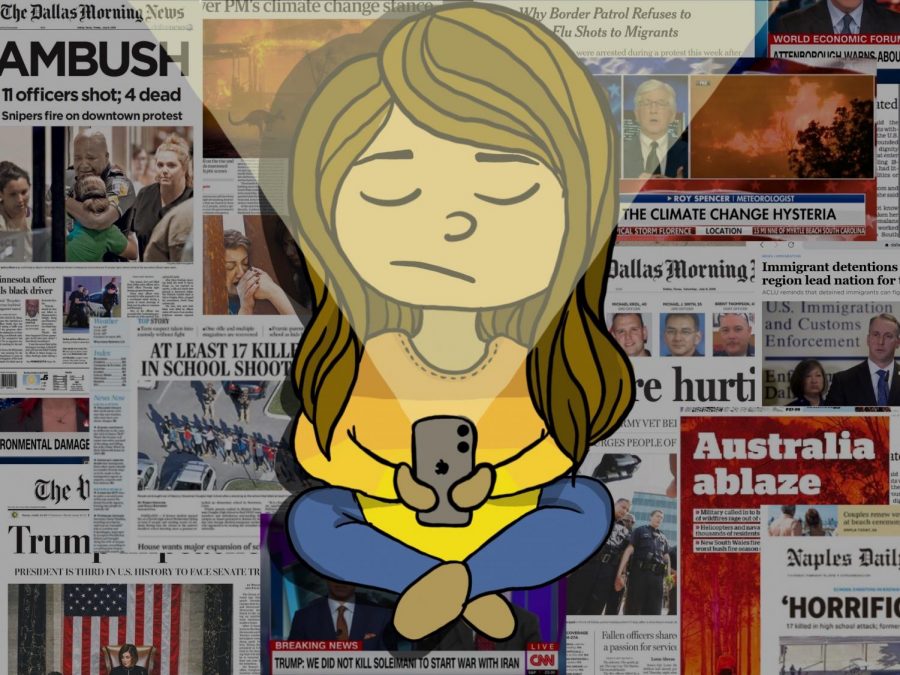Numb to the News
The Sidekick staff writer Alishba Javaid discusses how society is being desensitized to the news due to the constant exposure made easy by technology. Javaid explains how people have become apathetic to current events and offers solutions to change our mindsets.
January 24, 2020
Dazzling clothes on display, jewelry galore, the sounds of bargaining, exchange of cash—and within it all are beggars. This is not an uncommon view of a bazaar in Pakistan.
My heart would immediately feel horrible for the children, the mothers, the elderly, the deformed.
But what would make me feel even more worse was how people treated them like an annoyance and left them to be ignored. It was an occurrence I became familiar with growing up when visiting my family in Pakistan.
It is only now I realize the reasoning. The people living there have seen thousands of beggars in their lifetime. In one day alone, it is not uncommon to see 10 beggars. That, seven days a week, 12 months a year, every year, adds up. With constant exposure and time, one is bound to lose empathy.
We don’t all live in or visit developing countries, and the thing is, we don’t have to in order to be affected. Our Coppell bubble, sheltered and protected from the atrocities around us, has burst. We live on the internet now where all corners of the world are on display for us to see.
And if you can become desensitized in person, you can easily become desensitized online too.
It is like ignoring the Amber Alert on your phone or skipping the ad talking about giving donations to starving kids in Yemen. Now, it’s the news.
It seems every day brings a new shooting incident, a new scientific study revealing a negative report about climate change, a new protest, a new war crime. One headline after another.
“Thirty years ago when I was a high school student, I wasn’t exposed to as much news as [students] are,” Coppell High School psychology teacher Eric Walker said. “We had to actually read a newspaper and what you read was 24 hours old at best.”
We are bombarded with a large volume of content, so much news that it is difficult for our emotions to digest it all. We see the same thing in a different location which prompts a similar reaction of indifference. In the age of wanting to feel woke, we are feeling overwhelmed and becoming apathetic.
There is a psychological term for it: compassion fatigue. Psychologist Charles Figley defines it as a state of exhaustion and dysfunction, biologically, physiologically and emotionally, as a result of prolonged exposure to compassion stress.
“It’s the buzz of the day. We see it all day long and it doesn’t seem real anymore,” KCBY adviser Irma Kennedy said. “And then we’re waiting for the next disaster to happen. The more we see, the more we become apathetic.”
Some things we have been exposed to over the years have become so normalized that we simply do not have an emotional reaction to them anymore.
“We see these mass shootings that happen very frequently – almost every week, every day – we wake up to some news about some shooting in Walmart,” CHS sophomore Natasha Banga said. “We feel like maybe that’s just the way it is and there’s nothing we can do about it.”
The media also plays a role in viewer desensitization, where new stories are pushed out very often with sensational headlines trying to get high viewer engagement.
“News media tends to put out whatever is the most attention grabbing and emotional thing they can put out there, so it’s an entertainment perspective,” Walker said.
It is even easier with news outlets delving into social media, increasing exposure via the screens in our hands, thus increasing our chances of apathy.
“We see what’s happening but it’s always been happening but now we are just more exposed to it because it’s so easy to see,” CHS senior Umama Suriya said.
I have fallen into the routine of scrolling through my endless Instagram feed, seeing a horrific news event like images of Australian wildfires, liking and continuing to scroll without feeling much of anything. It seems as though my empathy is exhausted. My heart has ached so many times, it has gone numb.
All issues matter, but we can’t care about them all the time at the same time. What you need to do is pick a few key issues you’re passionate about that are important to you that you can make the most difference with to fight apathy with action.
Avoid the language you use that is part of the problem. “Why is no one talking about this?” “Who cares about this when this is happening?” It shames people for not caring about every single news occurrence.
At the end of the day, we need to recognize our mental limits and take a step back from the news for our own sanity to avoid this numbness. Start monitoring your digital diet and remember that you are in control of how much you expose yourself.
It’s good to care, it is in fact imperative that we care. However, all the compassion from caring too much about everything can lead us down a road of indifference and that doesn’t help anyone.
My mom said it best: help the ones you can, but you’ll drive yourself insane worrying and stressing about every single person on the street.
Follow Alishba Javaid (@alishbaj24) and @CHSCampusNews on Twitter.












Anthony Cesario • Jan 25, 2020 at 10:19 am
Great story Alishba!
Shivi Sharma • Jan 24, 2020 at 5:48 pm
I love this story, Alishba! I think it’s really relevant right now and I like the way you provided concrete solutions.